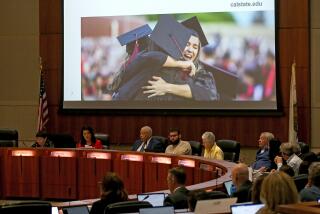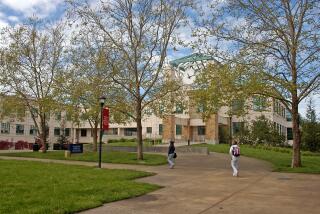By Ex-Lover : Bid to Sue Atkinson Thrown Out
- Share via
SAN FRANCISCO — The state Supreme Court has rejected a bid by a former Harvard professor to sue UC San Diego Chancellor Richard C. Atkinson for allegedly tricking her into an abortion with a fraudulent promise to father another child.
The justices, in a brief order issued late Thursday, refused to hear an appeal by Lee Perry of a state appellate court decision in September barring her from suing Atkinson for allegedly breaking a promise to father a child.
May Close the Door
The action appeared to bring state court proceedings to a close in a heated legal battle over Perry’s claims that Atkinson persuaded her to abort a 1977 pregnancy by promising to father another child within a year--even by artificial insemination if they were no longer together.
Perry, then an education and psychology professor at Harvard, has left that institution and is living in Boston. Atkinson, at that time a director of the National Science Foundation and separated from his wife, took over at UCSD in July, 1980.
Perry said Friday that she plans to ask the U.S. Supreme Court to review her case. “For me to settle out at this point would be accepting an unjust decision,” she said. “It’s really not OK to lie to pregnant women to trick them out of their right to choice.
“The kind of representations we make in our personal relationships should be as honest as those we make in other relationships, particularly if it’s the kind of lie that could affect somebody’s physical well-being,” she said. “To be able to do with a lie what you are not permitted to do with a fist is wrong.”
Perry’s lawyer, Suuzen Anderson of Spring Valley, said she plans to file the appeal within the next several months. “The gist of the case is that Ms. Perry contends that no person has the right to trick a woman into having an abortion,” Anderson said.
In February, 1986, shortly after the case came to trial, Atkinson agreed to pay Perry $250,000 to settle her claims that the chancellor caused her emotional distress by threatening to destroy her academic reputation and encouraging her to kill herself.
Provided for Appeal
The out-of-court settlement permitted Perry to appeal a trial court ruling barring her from pursuing a separate claim of fraud and deceit against Atkinson for his alleged failure to impregnate her.
Atkinson said then that the settlement was not an admission of liability but that he and his wife wanted to bring the matter to a close and avoid the expense and uncertainty of further legal proceedings.
Atkinson declined comment Friday and his attorney could not be reached.
Perry had been living in Del Mar while she worked on a book about psychology, but moved back to Boston several months ago, she said. In late 1985, she left a teaching job at United States International University and has been living on the $250,000 settlement she won from Atkinson.
“The whole issue about lies to induce somebody to get an abortion is an issue that goes beyond me,” Perry said Friday. “I’m a mother concerned about the loss of a child, not somebody who’s upset because of a romantic rejection. . . . I believed I was only postponing a child rather than renouncing one forever.”
Panel’s Reasoning Told
In the Sept. 25 decision, a state Court of Appeal panel in San Diego held that judges should not attempt to rule on “promises and representations” made by consenting adults over their sexual relationships.
“Although Atkinson may have deliberately misrepresented his intentions to Perry in order to persuade her to have an abortion, their procreative decisions were so intensely private that we decline to intervene,” Superior Court Judge Richard D. Huffman, sitting temporarily by special appointment, wrote for the court.
In a subsequent appeal to the state Supreme Court, Perry, serving as her own co-counsel, and her lawyer, Anderson, contended that the law should permit fraud suits in such circumstances as a way to “protect maternal health” and the “rights of women to choose to have and bear their children.”
More to Read
Sign up for Essential California
The most important California stories and recommendations in your inbox every morning.
You may occasionally receive promotional content from the Los Angeles Times.










